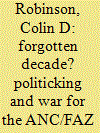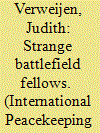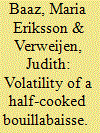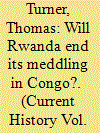|
|
|
Sort Order |
|
|
|
Items / Page
|
|
|
|
|
|
|
| Srl | Item |
| 1 |
ID:
183465


|
|
|
|
|
| Summary/Abstract |
The history of the Congo’s Armée nationale congolaise (1960–71) and Forces armées zairoïses (1971–97) between the ‘mercenaries’ mutinies’ of 1967 and the two Shaba incursions is worthy of further research. President Mobutu wished to make sure that the ANC/FAZ presented no threat to his rule, against the backdrop of scores of military coups going on across the breadth of Africa. Three key themes are evident in the history of the ANC/FAZ from 1967 to 1977, and are examined here for the first time. Mobutu controlled his armed forces mostly through divide and rule tactics, and most of the first theme discussions will focus on those affairs. The second theme is connected in a way to the first; the succession of favored praetorian guard formations. Thirdly the military linkages between the Zairian Angola incursion of 1975 and the following attempted Katangan exiles’ return to Shaba in 1977 and 1978 are sketched more strongly. A link between the second and third themes is provided by a solid background, for the first time, for the establishment of the Kamanyola Division, long an anomaly amongst Mobutu’s favored forces.
|
|
|
|
|
|
|
|
|
|
|
|
|
|
|
|
| 2 |
ID:
153526


|
|
|
|
|
| Summary/Abstract |
The literature on peacekeeping has paid scant attention to the interaction between peacekeeping troops and host country military. Addressing this gap in scholarly knowledge, this paper conceptualizes such interaction as ‘diagonal interoperability’. The latter is situated in-between ‘horizontal interoperability’ on the one hand, relating to interaction between different components of a peacekeeping mission, and ‘vertical interoperability’ on the other, referring to the relations between international peacekeepers and ‘peace-kept’ populations. The paper focuses on the Democratic Republic of the Congo, where UN forces and the Congolese army are engaged in joint military operations and army reform is part of the peacekeeping mission’s mandate. Studying both mutual representations and joint practices, the paper explores the organizational, political, discursive, and security-related factors that shape diagonal interoperability. It concludes that diagonal interoperability between the two forces is weak, as reflected in mutual distrust and ‘not-so joint’ joint operations. Perhaps surprisingly, it finds that shared military identities do not seem to facilitate collaboration. Rather, mutual perceptions of the ‘military Other’ are infused with discourses of cultural and political difference, therefore accentuating the power asymmetries that undermine diagonal interoperability.
|
|
|
|
|
|
|
|
|
|
|
|
|
|
|
|
| 3 |
ID:
123503


|
|
|
|
|
| Publication |
2013.
|
| Summary/Abstract |
In early 2012, Congolese army deserters formed the M23 rebel movement. This article analyses the insurgency and other armed group activity in the eastern DRC in the light of the politics of rebel-military integration. It argues that military integration processes have fuelled militarization in three main ways. First, by creating incentive structures promoting army desertion and insurgent violence; second, by fuelling inter- and intra-community conflicts; and third, by the further unmaking of an already unmade army. We argue that this is not merely the product of a 'lack of political will' on behalf of the DRC government, but must be understood in the light of the intricacies of Big Man politics and Kinshasa's weak grip over both the fragmented political-military landscape in the east and its own coercive arm. Demonstrating the link between military integration and militarization, the article concludes that these problems arise from the context and implementation of integration, rather than from the principle of military power sharing itself. It thus highlights the crucial agency of political-military entrepreneurs, as shaped by national-level policies, in the production of 'local violence'.
|
|
|
|
|
|
|
|
|
|
|
|
|
|
|
|
| 4 |
ID:
108445


|
|
|
|
|
| Publication |
2011.
|
| Summary/Abstract |
The global attention focused on sexual violence in the DRC has not only contributed to an image of the Congolese army as a vestige of pre-modern barbarism, populated by rapists, and bearing no resemblance to the world of modern armies; it has also shaped gender and defence reform initiatives. These initiatives have become synonymous with combating sexual violence, reflecting an assumption that the gendered dynamics of the army are already known. Crucial questions such as the 'feminization' of the armed forces are consequently neglected. Based on in-depth interviews with soldiers in the Congolese armed forces, this article analyses the discursive strategies male soldiers employ in relation to the feminization of the army. In the light of the need to reform the military and military masculinities, the article discusses how globalized discourses and practices render the Congolese military a highly globalized sphere. It also highlights the particular and local ways in which military identities are produced through gender, and concludes that a simple inclusion of women in the armed forces in order to render men less violent might not have the pacifying effect intended.
|
|
|
|
|
|
|
|
|
|
|
|
|
|
|
|
| 5 |
ID:
119404


|
|
|
|
|
| Publication |
2013.
|
| Summary/Abstract |
[T]he arrest of Ntaganda and his trial should serve as reminders to the Rwandan authorities that their interference in DRC is no longer acceptable, if it ever was.
|
|
|
|
|
|
|
|
|
|
|
|
|
|
|
|
|
|
|
|
|